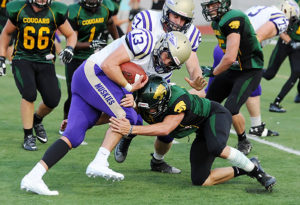May 21, 2021Concussion Biomarkers Highlight NCAA-DoD Grand Alliance Conference

The emergence of concussion biomarkers was among the critical research shared at the fourth annual Grand Alliance Concussion Conference.
The NCAA Sport Science Institute and U.S. Department of Defense, in partnership with the Atlantic Coast Conference (ACC) and Virginia Tech, recently hosted the conference, titled “A New Era of Scientific Collaboration,” on April 30.
At the conference, concussion experts and researchers shared preliminary and recently published data from the NCAA-DOD Concussion Assessment, Research and Education Consortium, the largest concussion and repetitive head impact study in history. Researchers noted that advancements in neuroimaging and blood and genetic testing have heightened understanding of concussion biomarkers, objectively measured biological indicators of injury.
“We’ve learned from other areas of medicine over the past many decades that the utility of biomarkers extends far beyond the diagnostic. They can inform the underlying pathophysiology of a disease state or, in this case, an injury state,” said Michael McCrea, professor and vice-chair of research in the Department of Neurosurgery at the Medical College of Wisconsin. McCrea also directs the advanced research core of the CARE Consortium, part of the broader NCAA-DOD Grand Alliance.
 “Biomarkers have diagnostic utility, but they are also of great importance prognostically in terms of how early objective markers of injury and recovery might help us predict recovery outcome for individuals affected by mTBI (mild traumatic brain injury).”
“Biomarkers have diagnostic utility, but they are also of great importance prognostically in terms of how early objective markers of injury and recovery might help us predict recovery outcome for individuals affected by mTBI (mild traumatic brain injury).”
Speakers at the conference touted the significant strides being made in concussion research.
“This event, like the three that preceded it, has been almost a decade in the making. The notion that, for the first time in history, a study would provide quality data from student-athletes and military cadets across the country that could be thoughtfully and scientifically analyzed to provide novel information about concussion and repetitive head impact in all NCAA sports and military training is remarkable,” NCAA President Mark Emmert said in his opening remarks. “We can now, with much greater clarity, understand the nature of concussion and repetitive head impact, and we are poised to continue to do so as the study evolves.”
Daniel Sui, vice president for research and innovation at Virginia Tech, lauded the many “voices and insights from all over the research and athletics worlds” whose efforts have allowed researchers to make an empirical connection between what happens in sports fields and what occurs off them. ACC Commissioner Jim Phillips expressed a similar sentiment.
“The partnerships between the NCAA and medical organizations have led to world-class research and the development of important publications in education,” Phillips said. “These partnerships, such as the NCAA-DOD Grand Alliance, ensure constant growth and improvement in the safety of our sports.”
In addition to biomarkers, presentations delved into clinical manifestations of concussion, including research into the age of first exposure to a contact sport and how biological sex and gender norms influence concussion diagnosis, treatment and recovery. Research on the biomechanics of repetitive head impacts quantified by accelerometer data and the related implications associated with changing the culture of concussion also were discussed. The conference also explored broader policy implications from this study.
“Data from the NCAA-DOD Grand Alliance have been translated into important policy statements that have real impact to the men and women who serve our country, and the result is a greater state of military readiness combined with brain health,” said Katherine Lee, special assistant to the deputy assistant secretary of defense for health readiness policy and oversight.
In 2013, newly appointed NCAA Chief Medical Officer Brian Hainline consulted and collaborated with national office and membership leaders to identify nine strategic priorities that would inform NCAA efforts to support membership efforts related to student-athlete health and safety.
Hainline and retired U.S. Army Col. Dallas Hack, a renowned brain health expert who oversaw all research pertaining to traumatic brain injury at the U.S. Department of Defense, sought to arrive at a definitive action plan in the military cadet and student-athlete populations. In December 2013, the two physicians invited 20 leading researchers in concussion and mild traumatic brain injury to Washington, D.C., to perform a knowledge gap analysis on concussion.
“We didn’t know the natural history of concussion. We didn’t know if there were any objective biomarkers for concussion. We didn’t know if concussion was the same in men and women. We didn’t know if concussion was the same in various sports, and, importantly, we didn’t have any idea what the meaning of repetitive head impact was,” Hainline said. “This was an emerging concept that also needed to be studied.”
That meeting laid the foundations of what would become the most comprehensive study of acute concussion and mild traumatic brain injury in military cadets and student-athletes ever conducted. The NCAA-DOD Grand Alliance and its long-term CARE Consortium study are committed to concussion research and exploring how to change the historical culture surrounding concussion.
“With this study, we have had a great deal of knowledge come forward through NCAA member schools getting together and solving problems collectively and in a collaborative manner,” Hainline said. “As we did this in the short term with COVID-19, we are now doing this in the long term with the Grand Alliance, coming to solutions that ultimately allow us to make more informed decisions around sport safely.”
At no cost to attendees, the NCAA-DOD Grand Alliance conference was designed for athletic trainers, team physicians, sports medicine clinicians, and athletic health care administrators from NCAA member schools. Other stakeholders who oversee and manage sports-related concussions and repetitive head impacts also participated.


